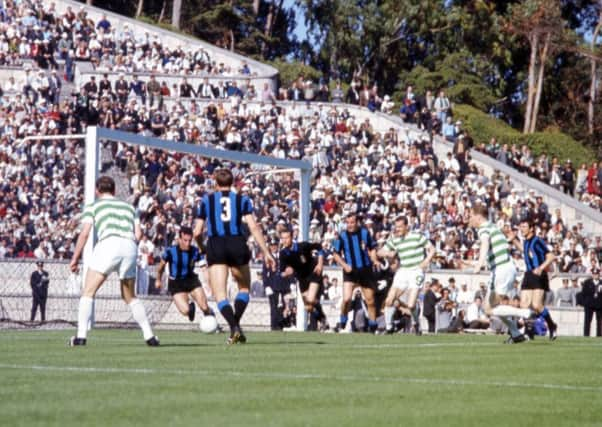Stevie Chalmers, Lisbon and the moment that changed everything


He will forever be remembered, of course, for flicking out his right boot in typically instinctive fashion to guide home the 85th-minute winner in Lisbon on 25 May 1967 which resulted in Celtic becoming the first British club to lift the European Cup.
It was, as Chalmers himself observed in later years, the ”moment that changed everything”. Yet there was so much more to this most unassuming of men in a body of work at Celtic which stands favourable comparison with any of the club’s most revered figures. Only three players – Jimmy McGrory, Bobby Lennox and Henrik Larsson – scored more goals for Celtic than the 231 netted by Chalmers in his 406 appearances for them from 1959 to 1971.
Advertisement
Hide AdAdvertisement
Hide AdLike his great friend and former captain, Billy McNeill, whose own passing only last week brought such poignancy to the culmination of this season for the Scottish champions, Chalmers arrived at the club during one of the less stellar periods of their history.
But while he endured those barren seasons of the early 1960s, Chalmers was never anything less than grateful to be playing for the team he loved. The traumatic experience of contracting the potentially fatal tuberculosis meningitis when he was 20 and still playing junior football for Ashfield ensured Chalmers was fully appreciative of everything life brought him in subsequent years.
He was 22 when he made his debut for Celtic and there was an early indication of his prolific ability in front of goal when he scored 15 goals in 19 appearances in his first full season as a professional.
It was a strike-rate Chalmers would maintain on an impressively consistent basis but the silverware to match it proved elusive initially. His first major disappointment came in the 1961 Scottish Cup final, which Celtic lost 2-0 in a replay against Dunfermline, while the 3-0 loss to Rangers in the 1963 Hampden showpiece illustrated the general superiority enjoyed by the Ibrox club during that era.
The sea change in the fortunes of Chalmers and all connected with Celtic came with the arrival of Jock Stein as manager in 1965. The transformational effect extended to how Chalmers functioned as a striker, taking his game to a new level.
While his goalscoring capacity could never be questioned, Chalmers did attract some criticism during his early years at Celtic for lacking the game intelligence necessary to make the most of his blistering pace.
It was harnessed brilliantly by the peerlessly perceptive Stein as Chalmers became the focal point of the outstanding Celtic team which dominated Scottish football and conquered Europe in the late 1960s and early 1970s.
Chalmers claimed the first winner’s medal of his career as Celtic defeated Dunfermline 3-2 in the 1965 Scottish Cup final and was a key figure the following season when the Parkhead club became Scottish champions for the first time in 12 years.
Advertisement
Hide AdAdvertisement
Hide AdPerhaps the most powerful indication of the balance of power in Scottish football shifting in Celtic’s favour that season came when Chalmers struck a hat-trick in the 5-1 win over Rangers on 3 January 1966. He remained the last player to claim a treble in an Old Firm fixture until Moussa Dembele did so in another 5-1 Celtic victory in 2016.
The 1966-67 season would prove the defining one for Chalmers and the rest of the side who would become known as the Lisbon Lions.
Every domestic trophy was claimed by Stein’s men who topped it all off by becoming the first non-Latin team to win European football’s biggest prize.
Chalmers would have the decisive touch in the 2-1 success over Inter Milan in the final but his contribution was immense throughout a campaign in which he also scored crucial goals against FC Zurich, Nantes and Vojvodina in the earlier rounds.
The honours continued to pile up for Chalmers, with personal highlights including two goals in the 1967-68 League Cup final win over Dundee and the last goal in the 4-0 Scottish Cup final demolition of Rangers the following season.
By contrast, his international career was curiously truncated. He scored on his debut for Scotland, in a 3-2 defeat away to Wales in October 1964, and struck again on his second appearance in a 3-1 World Cup qualifying win over Finland at Hampden the same month.
But Chalmers went on to play only three more times for his country, albeit he was able to savour scoring Scotland’s goal in a 1-1 draw with Brazil – who included Pele in their line-up – at Hampden in the summer of 1966.
At the age of 32, Chalmers suffered a major blow when he sustained a broken leg during Celtic’s League Cup final victory over St Johnstone in October 1969.
Advertisement
Hide AdAdvertisement
Hide AdHe made a brief return to the Celtic side the following season, scoring what proved to be his last goal for the club in a 6-1 win over Clyde in May 1971, but was diminished by the injury.
Chalmers did extend his playing career, with decent spells at Morton and Partick Thistle before hanging up his boots in 1975.
He returned to Celtic, first of all as a youth coach and then in an administrative post with Celtic Pools, and remained much loved and greatly admired by all connected with the club.